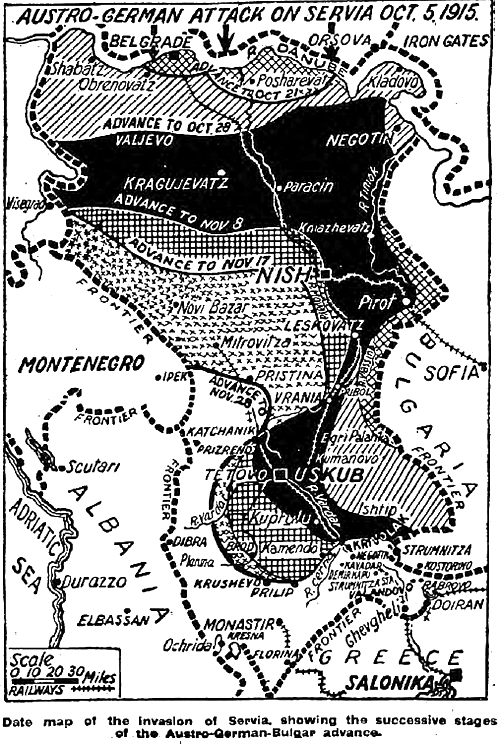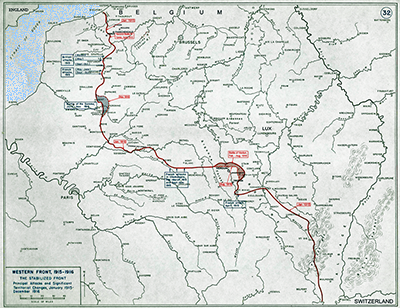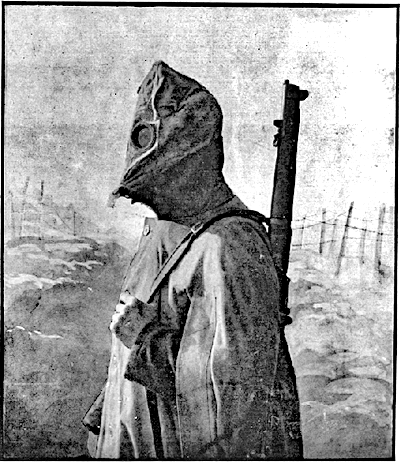First World War Project
Home News - December 1915
The Western Front continued largely "stabilised" from January 1915 to the end of 1916. But assaults continued to take their toll on our local men; mostly on the Western Front.
December was marked by fighting in Serbia, Macedonia (French forces retreat into Greek territory), evacuation ordered of Suvla and Anzac (8th to 20th Dec.), Siege at Kut, Austro-Hungarian conflict with Italy (fourth battle of Isonzo ends 10th Nov. to 10th Dec.), Persia and Egypt. On 28th December, the evacuation of the remainder of the Gallipoli Peninsula was ordered. Forces withdrawn from this front were redistributed around the other theatres.
Field-Marshal Sir John French resigned as Commander-in-Chief of British Armies in France (15th Dec.). Two resignations on 22nd December: Lieut.-General Sir W. Robertson resigns as Chief of the General Staff, BEF, France; Lieut.-General Sir A. J. Murray, Chief of the Imperial General Staff.
The retreat of Allies from "The Dardanelles/Gallipoli Peninsula Campaign" was summarised soberly in his Official Despatch written on 6th March 1916 (covering these latter months of 1915) by General Sir Charles Monro who argued for and then arranged total evacuation under the noses of the Turkish forces:
"The positions occupied by our troops presented a military situation unique in history. The mere fringe of the coast line had been secured. The beaches and piers upon which they depended for all requirements in personnel and material were exposed to registered and observed Artillery fire. Our entrenchments were dominated almost throughout by the Turks. The possible Artillery positions were insufficient and defective. The Force, in short, held a line possessing every possible military defect. The position was without depth, the communications were insecure and dependent on the weather. No means existed for the concealment and deployment of fresh troops destined for the offensive - whilst the Turks enjoyed full powers of observation, abundant Artillery positions, and they had been given the time to supplement the natural advantages which the position presented by all the devices at the disposal of the Field Engineer."
November ended (30th) with the formal signature of the Pact of London by Great Britain, France, Russia, Japan, and Italy. This defined the shape of the war at that time.
Crime on the Home Front - Postmens' thefts
| Whitstable Times and Herne Bay Herald of 4th December 1915 |
| POSTMEN'S THEFTS. – CASES AT KENT ASSIZES. At the Kent Assizes at Maidstone on Thursday, Percival Sidney Cairns, 30, postman, pleaded guilty to stealing a postal packet containing 3s., at Canterbury, on April 29th.- Prisoner erased the name of the payee of the postal order and filled in another in a not very skilful manner. He was employed as postman at Canterbury from 1905 to 1908, and re-engaged in 1914. During the interval he had been engaged by a private firm, who gave him a good testimonial. Since the charge, Mr. Tassell, bootmaker, had been teaching prisoner boot and harness repairing, and he now gave him a good character.- Prisoner expressed contrition and said he wished to join the Army. He was thereupon put back and afterwards, in company with two other prisoners, was taken to the barracks to see if he was fit for enlistment. --- Richard William Parris, 31, postman pleaded guilty to stealing a postal packet containing a half-crown, florin, shilling, sixpence, two halfpennies and three penny stamps, at Folkestone, in June. Prisoner entered the postal service 18 years ago as a boy messenger, and in 1911 went to Folkestone as postman. In this case there had been complaints and a test letter was taken by prisoner. Prisoner said in 1914 he was granted an increase in wages, and although he had made repeated applications for the money had not received it. He was a married man with one child, and could not afford to be kept waiting for the 2s. per week extra pay. He was willing to join the army, but did not see why a parried man should enlist when single men of 22 or 23 were waiting to take other men's positions. As prisoner again announced his willingness to enlist he was put back with the object of seeing if he would be accepted. --- William George Wood, 22, postman, pleaded guilty to stealing two postal orders of the value of 3s. and 3s. and 3s. 6d., and eight postage stamps, at Whitstable, on September 28th. In this case prisoner also signified his willingness to join the army and he was put back. --- William George Stacey, 47, auxiliary postman, pleaded guilty to stealing a postal packet, containing a match-box, four penny stamps and 4s. 2d., at Bromley, in August. It was stated, on prisoner's behalf, that he was of previous good character and that he took the packet in order to buy some spectacles and that he had been engaged while awaiting trial in a munition factory, and had been promoted to an examiner. His Lordship bound him over in £25. --- William Rowe, 61, postman, pleaded guilty to stealing a postal packet containing a postal order for 6s., and two 10s. Treasury notes at Gillingham. Three hundred postal packets were found in Prisoner's possession, and he was sentenced to six months' hard labour. |
Kent Coal Mining Accident - Snowden Colliery
| The Times of 8th December 1915 |
| PIT ACCIDENT IN KENT. MINERS' RESCUE OF WOUNDED COMRADE. Two men were killed and two seriously injured in an accident early yesterday [7th December 1915] at the Snowden Colliery, between Dover and Canterbury. Ten men were working in the deep mining of No.2 shaft, 2,100ft., below ground, when a hoppit [a hoist bucket] containing about 30cwt. of debris broke away from the pithead owing to overwinding and fell among them. Two men named Tom Parker and John Mount were crushed to death and another named D. Mallett had his arm so badly crushed that it had to be amputated immediately on his reaching the hospital. Another badly injured man named George Fagg was also taken to the hospital. The hoppit in its fall struck against the sides of the shaft, breaking pipes and destroying the electric light gear, so that the pit was in darkness, and it was two hours before the rescue party got down to the men. There were then 10ft. of water in the pit, and Mallett, with his injured arm, was found, being held on to an iron ladder above the water by two of his comrades, who had been so holding him up for the whole of the two hours. Owing to the flooding of the pit it was not found possible to recover at once the bodies of the killed. |
Swindler in the Dock - 12 month's hard labour
| Whitstable Times and Herne Bay Herald of 11th December 1915 |
| SENTENCE ON A SWINDLER. - On the concluding day of the Kent Assizes, Sidney Wraight, a dealer, of Blue House, Long Reach, Whitstable, was sentenced to twelve months' hard labour for obtaining credit by false pretences from Annie Gertrude Chambers, at Faversham, and from Dan Easton and Co., at Sittingbourne. Wraight formerly resided at Fordwich, later he removed to the neighbourhood of Chatham, and more recently to Hernhill, near Faversham. Numerous instances of the manner in which he had obtained goods from traders and re-sold them for what they would fetch were reported. |
Lord Derby's Recruiting Scheme
| East Kent Gazette of 11th December 1915 |
| DODDINGTON - LORD DERBY'S RECRUITING SCHEME.- The Doddington Council School will be open from three to six p.m. today (Saturday), for the purpose of attesting men eligible under Lord Derby's recruiting scheme for military service. |
News of gas attacks makes it important to show soldiers are being helped
| llustrated London News of 11th and 18th December 1915 |
One of the strangest results of the war has been its effect upon the appearance of the modern fighting man, when equipped in full scientific panoply. Thus we have seen the reversion to helmets, the use of skin-coats in winter, and the bomber's novel outfit. But the weirdest effect of all is that produced by the wearing of anti-gas respirators, or masks, which make the soldier look like a Familiar of the Spanish Inquisition, with pointed hood and sinister eye-pieces. Our photograph shows the new mask against asphyxiation gases that has been supplied to the British troops in France. The valve in front will be noticed. It may be recalled that a German war-correspondent, describing the battle of Loos said: "Behind the fourth gas-and-smoke cloud there suddenly emerged Englishmen in thick lines and storming columns. They rose suddenly from the earth, wearing smoke-masks over their faces, and looking not like soldiers but like devils." The scene was illustrated in our issue of October 30. Citation: "The Modern Man-At-Arms: Like a Familiar of the Inquisition—A British Soldier in the New Gas-Mask." Illustrated London News [London, England] 11 Dec. 1915: [749]. Illustrated London News. Web. 19 Dec. 2015. |
Wedding of Greenstreet man - Ernest Millen
| Kent Messenger of 18th December 1915 |
Miss Edith Henniker, who for the past five years has been one of the assistant mistresses at the Tonbridge Road Council Schools, Maidstone, was married at the Sittingbourne Congregational Church on Wednesday [15th December], to Mr. Ernest Millen, of Greenstreet. The bride is the eldest daughter of Mr. and Mrs. J. Henniker, of Park Road, Sittingbourne, and bridegroom is the younger son of Mr. and Mrs. E.C. Millen of Claxfield House, Greenstreet. The happy couple, who will reside at Teynham, have received many handsome presents, including a case of fish servers and a case of fish knives and forks from the staff at the Tonbridge Road Schools, and a set of cut glass dishes from the children in the bride's former class. |
Suicide by Buffs Recruit with bad back
| Whitstable Times and Herne Bay Herald of 18th December 1915 |
| SUICIDE OF A 4TH BUFF. EXTRAORDINARY EVIDENCE. The Folkestone Coroner last week held an inquest on the body of John Henry Blake, a private in 4th Buffs, stationed at Canterbury, who was found shot in the house of his brother-in-law, 16, Sidney Street, Folkestone. It came out in evidence that the deceased who was 39 years of age, and was formerly of Iwade, Isle of Sheppey, enlisted about three weeks ago. He told his brother-in-law that he had been practically forced to join the Army, and he was very agitated about it. He said that having a "crippled back," a big lump coming out like a camel every time he stooped, he made sure he would be rejected, but he was passed. He was tormented because he could not get his accoutrements on. The sergeant had sent him again to the doctor, who, however, told him he was to carry on. Deceased had to be back in barracks at Canterbury by 9.30 on Monday morning. At that hour he was found dead in the kitchen at the house of his brother-in-law. He had been shot in the chest, and a rifle was lying by his side The jury returned a verdict of "Suicide whilst temporarily insane." |
Teynham recruits number more than 100
| Faversham and North East Kent News of 18th December 1915 |
| Teynham has now at least 115 men in the Forces. Writing in the Deanery Magazine the Vicar says: "The last few days has seen a revival in the number of those who offer themselves. St. Andrew's has lost its organist, and our fine choir at the Parish Church is almost depleted of men. We thank them for all they have done in the past, and hope that before long happier ties will bring them back again. |
† - Twenty-second Loss in the Kingsdown with Creekside Benefice - 20th December; Duhallow Advance Dressing Station Cemetery, Ypres Commune.
Private Walter William Richard SEARS (of Newnham "Royal Oak"), Killed in action, aged 26 years |
ANTI-AIRCRAFT CORPS. - possible refuge for shirkers?
In a House of Commons Debate on 20th December 1915 a question was posed by Sir GEORGE SCOTT ROBERTSON
who "asked the First Lord of the Admiralty how many men of military age are employed in the Anti-Aircraft Corps and in its telephone section; whether all such men, if there are any who are not suffering from physical disability, have been attested under Lord Derby's scheme, and, if not, for what reason; and whether in the future no recruits will be accepted for this corps who are of military age and fit for military service?
§ The PARLIAMENTARY SECRETARY to the ADMIRALTY (Dr. Macnamara)
There are at present a considerable number of men in the Anti-Aircraft Corps of military age. A number of them are only employed at night, being engaged in other work during the day. As to whether or not any of the men of military age now serving in the Anti-Aircraft Corps would be rejected on medical grounds for Army service I cannot say, for the reason that there is no medical examination on entry into the Force. Members of the Force could not attest under Lord Derby's scheme since they are already enrolled in the Royal Naval Volunteer Reserve. But all men who wish to join the Army have always been given their discharge and every facility afforded them. A considerable number have already sought their discharge from the corps in order to join the Army. For the last nine months no recruits of military age have been accepted unless officially rejected on medical grounds for service with the Colours.
§ Sir G. SCOTT ROBERTSON
Is my right hon. Friend quite satisfied that this Anti-Aircraft Corps is not being improperly used?
§ Dr. MACNAMARA
I do not know in what particular my hon. Friend means, but perhaps he will put his point specifically on the Paper.
Death of Mary Ann Thomas - of Nouds Farm
| Kent Messenger of 1st January 1916 |
| DEATH OF MRS. J. THOMAS.- The death took place on Christmas Eve, at Lynsted, of Mrs. Mary Ann Thomas, the wife of Mr. John Thomas, of Nouds Farm, Lynsted. The deceased lady, who had been ill for some years, was 68 years of age. She was a native of Lincolnshire, but since her marriage 36 years ago had continuously resided at Lynsted, where she was beloved and esteemed. The funeral took place on Tuesday, amid every manifestation of respect. |
Christmas in the Milton Workhouse
| Kent Messenger of 1st January 1916 |
| CHRISTMAS AT SITTINGBOURNE. The holiday season in Sittingbourne was spent in somewhat subdued fashion in keeping with the times. The churches were fuller at the Christmas morning services, and more than usual it was a "home festival." At the Milton Poor Law Institution the inmates were regaled as usual, and there was the time-honoured entertainment in the evening. The local garrison celebrated the day by a feast at midday, roast turkeys and plum puddings being in the menu. Later there were entertainments for the men at the picture halls and elsewhere. The patients at the two war hospitals also fared sumptuously, and London entertainers afterwards amused them. A prominent member of the Joint Hospital Board visited the Keycol hill Hospital and Sanatorium on Christmas Day dressed as "Father Christmas," and distributed gifts to the 200 inmates. Most of the patients were children in a state of convalescence. |
Death of Admiral Lord Nelson's niece (widow of Rector of Norton)
| Kent Messenger of 1st January 1916 |
| A great niece of Admiral Lord Nelson passed away on Sunday [28th December 1915] in the person of Mrs. Susannah Crowther, widow of the Rev. W. Crowther, late Rector of Norton, near Faversham, Mrs. Crowther was a daughter of the late Mr. John Bendyshe, of Varrington Hall, Cambridge, and had latterly resided at Bournemouth. It may not perhaps be generally known that the wife of a former Vicar of Tenterden was the natural daughter of Lord Nelson. |
Soldiers attack 'van dwellers'
| Kent Messenger of 1st January 1916 |
| A RAID BY SOLDIERS. On Sunday evening [28th December] a colony of van dwellers was attacked by about 100 soldiers belonging to the local garrison, and before the soldiers left they had done many pounds' worth of damage. It appears that earlier on Sunday evening a member of the colony had a fight with one of the soldiers, and in the course of the affray the civilian is said to have taken out his knife and cut the soldier rather badly. His comrades heard about it; hence the raid. House vans were overturned and the contents smashed. Wooden buildings were also wrecked. As it was pitch black when the raid took place the military authorities have yet discovered the ringleaders. |
ARTEFACTS - Background Records...................
Map of opposing formations in 1915


Balkan Front from 5th October: Daily Express of 29th November 1915


 THE MODERN MAN-AT-ARMS: LIKE A FAMILIAR OF THE INQUISITION.
THE MODERN MAN-AT-ARMS: LIKE A FAMILIAR OF THE INQUISITION.  World War 1 Pages
World War 1 Pages